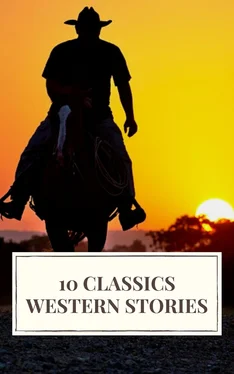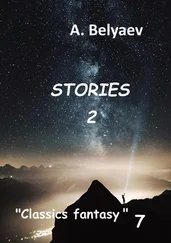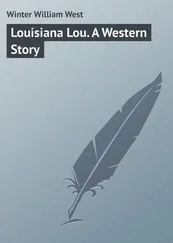Samuel Merwin - 10 Classics Western Stories
Здесь есть возможность читать онлайн «Samuel Merwin - 10 Classics Western Stories» — ознакомительный отрывок электронной книги совершенно бесплатно, а после прочтения отрывка купить полную версию. В некоторых случаях можно слушать аудио, скачать через торрент в формате fb2 и присутствует краткое содержание. Жанр: unrecognised, на английском языке. Описание произведения, (предисловие) а так же отзывы посетителей доступны на портале библиотеки ЛибКат.
- Название:10 Classics Western Stories
- Автор:
- Жанр:
- Год:неизвестен
- ISBN:нет данных
- Рейтинг книги:3 / 5. Голосов: 1
-
Избранное:Добавить в избранное
- Отзывы:
-
Ваша оценка:
- 60
- 1
- 2
- 3
- 4
- 5
10 Classics Western Stories: краткое содержание, описание и аннотация
Предлагаем к чтению аннотацию, описание, краткое содержание или предисловие (зависит от того, что написал сам автор книги «10 Classics Western Stories»). Если вы не нашли необходимую информацию о книге — напишите в комментариях, мы постараемся отыскать её.
The novels are sorted alphabetically by the authors.
Content:
The Log of a Cowboy by Andy Adams
The Bridge of the Gods by Frederic Homer Balch
The Lure of the Dim Trails by B.M. Bower
Hidden Water by Dane Coolidge
The Last of the Mohicans by James Fenimore Cooper
The Prairie by James Fenimore Cooper
Salomy Jane by Bret Harte
Astoria by Washington Irving
The road to Frontenac by Samuel Merwin
That Girl Montana by Marah Ellis Ryan
10 Classics Western Stories — читать онлайн ознакомительный отрывок
Ниже представлен текст книги, разбитый по страницам. Система сохранения места последней прочитанной страницы, позволяет с удобством читать онлайн бесплатно книгу «10 Classics Western Stories», без необходимости каждый раз заново искать на чём Вы остановились. Поставьте закладку, и сможете в любой момент перейти на страницу, на которой закончили чтение.
Интервал:
Закладка:
“You hear it? That death-wail tells all the future holds for you. Before yonder red shadow of a sun”—pointing to the sun, which shone dimly through the smoke—“shall set, the bravest of the Mollalies will be dead. Before the moon wanes to its close, the Willamette race will have passed away. Think you Multnomah’s seat is empty? The Pestilence sits in Multnomah’s place, and you will all wither in his hot and poisonous breath. Break up your council. Go to your lodges. The sun of the Willamettes is set, and the night is upon us. Our wars are done; our glory is ended. We are but a tale that old men tell around the camp-fire, a handful of red dust gathered from mimaluse island,—dust that once was man. Go, you that are as the dead leaves of autumn; go, whirled into everlasting darkness before the wind of the wrath of the Great Spirit!”
He flung out his arms with a wild gesture, as if he held all their lives and threw them forth like dead leaves to be scattered upon the winds. Then he turned away and left the grove. The crowd of warriors who had been looking on broke up and went away, and the chiefs began to leave the council, each muffled in his blanket. The grave and stately sachem who had opened the council tried for a little while to stay the fatal breaking up, but in vain. And when he saw that he could do nothing, he too left the grove, wrapped in stoical pride, sullenly resigned to whatever was to come.
And so the last council ended, in hopeless apathy, in stubborn indecision,—indecision in everything save the recognition that a doom was on them against which it was useless to struggle.
And Mishlah? He returned to his lodge, painted his face as if he were going to battle, and then went out to a grove near the place where the war-dances of the tribe were held. His braves followed him; others joined them; all watched eagerly, knowing that the end was close at hand, and wondering how he would die.
He laid aside his blanket, exposing his stripped body; and with his eagle plume, in his hair and his stone tomahawk in his hand, began to dance the war-dance of his tribe and to chant the song of the battles he had fought.
At first his utterance was broken and indistinct, his step feeble. But as he went on his voice rang clearer and stronger; his step grew quicker and firmer. Half reciting, half chanting, he continued the wild tale of blood, dancing faster and faster, haranguing louder and louder, until he became a flame of barbaric excitement, until he leaped and whirled in the very madness of raging passion,—the Indian war-frenzy.
But it could not last long. His breath came quick and short; his words grew inarticulate; his eyes gleamed like coals of fire; his feet faltered in the dance. With a final effort he brandished and flung his tomahawk, uttering as he did so a last war-cry, which thrilled all who heard it as of old when he led them in battle. The tomahawk sunk to the head in a neighboring tree, the handle breaking off short with the violence of the shock; and the chief fell back—dead.
Thus passed the soul of the fierce Mollalie. For years afterward, the tomahawk remained where it had sunk in the tree, sole monument of Mishlah. His bones lay unburied beneath, wasted by wind and rain, till there was left only a narrow strip of red earth, with the grass springing rankly around it, to show where the body had been. And the few survivors of the tribe who lingered in the valley were wont to point to the tomahawk imbedded in the tree, and tell the tale of the warrior and how he died.
Why dwell longer on scenes so terrible? Besides, there is but little more to tell. The faithless allies made a raid on the valley; but the shrouding atmosphere of smoke and the frightful rumors they heard of the great plague appalled them, and they retreated. The pestilence protected the Willamettes. The Black Death that the medicine-men saw sitting in Multnomah’s place turned back the tide of invasion better than the war-chief himself could have done.
Through the hot months of summer the mortality continued. The valley was swept as with the besom of destruction, and the drama of a people’s death was enacted with a thousand variations of horror. When spring came, the invaders entered the valley once more. They found it deserted, with the exception of a few wretched bands, sole survivors of a mighty race. They rode through villages where the decaying mats hung in tatters from the half-bare skeleton-like wigwam poles, where the ashes had been cold for months at the camp-fires; they rode by fisheries where spear and net were rotting beside the canoe upon the beach. And the dead—the dead lay everywhere: in the lodges, beside the fisheries, along the trail where they had been stricken down while trying to escape,—everywhere were the ghastly and repulsive forms.
The spirit of the few survivors was broken, and they made little resistance to the invaders. Mongrel bands from the interior and the coast settled in the valley after the lapse of years; and, mixing with the surviving Willamettes, produced the degenerate race our own pioneers found there at their coming. These hybrids were, within the memory of the white man, overrun and conquered by the Yakimas, who subjugated all the Indians upon Wappatto Island and around the mouth of the Willamette in the early part of the present century. Later on, the Yakimas were driven back by the whites; so that there have been three conquests of the lower Willamette Valley since the fall of the ancient race,—two Indian conquests before the white.
The once musical language of the Willamettes has degenerated into the uncouth Chinook, and the blood of the ancient race flows mixed and debased in the veins of abject and squalid descendants; but the story of the mighty bridge that once spanned the Columbia at the Cascades is still told by the Oregon Indians. Mingled with much of fable, overlaid with myth and superstition, it is nevertheless one of the historic legends of the Columbia, and as such will never be forgotten.
One word more of Cecil Gray, and our tale is done.
The Shoshone renegade, who resolved at Cecil’s death to become a Christian, found his way with a few followers to the Flat-Heads, and settled among that tribe. He told them of what he had learned from Cecil,—of the Way of Peace; and the wise men of the tribe pondered his sayings in their hearts. The Shoshone lived and died among them; but from generation to generation the tradition of the white man’s God was handed down, till in 1832 four Flat-Heads were sent by the tribe to St. Louis, to ask that teachers be given them to tell them about God.
Every student of history knows how that appeal stirred the heart of the East, and caused the sending out of the first missionaries to Oregon; and from the movement then inaugurated have since sprung all the missions to the Indians of the West.
Thus he who gave his life for the Indians, and died seemingly in vain, sowed seed that sprung up and bore a harvest long after his death. And to-day, two centuries since his body was laid in the lonely grave on Wappatto Island, thousands of Indians are the better for his having lived. No true, noble life can be said to have been lived in vain. Defeated and beaten though it may seem to have been, there has gone out from it an influence for the better that has helped in some degree to lighten the great heartache and bitterness of the world. Truth, goodness, and self-sacrifice are never beaten,—no, not by death itself. The example and the influence of such things is deathless, and lives after the individual is gone, flowing on forever in the broad life of humanity.
I write these last lines on Sauvie’s Island—the Wappatto of the Indians,—sitting upon the bank of the river, beneath the gnarled and ancient cottonwood that still marks the spot where the old Columbia trail led up from the water to the interior of the island. Stately and beautiful are the far snow-peaks and the sweeping forests. The woods are rich in the colors of an Oregon autumn. The white wappatto blooms along the marshes, its roots ungathered, the dusky hands that once reaped the harvest long crumbled into dust. Blue and majestic in the sunlight flows the Columbia, river of many names,—the Wauna and Wemath of the Indians, the St. Roque of the Spaniards, the Oregon of poetry,—always vast and grand, always flowing placidly to the sea. Steamboats of the present; batteaux of the fur traders; ships, Grey’s and Vancouver’s, of discovery; Indian canoes of the old unknown time,—the stately river has seen them all come and go, and yet holds its way past forest and promontory, still beautiful and unchanging. Generation after generation, daring hunter, ardent discoverer, silent Indian,—all the shadowy peoples of the past have sailed its waters as we sail them, have lived perplexed and haunted by mystery as we live, have gone out into the Great Darkness with hearts full of wistful doubt and questioning, as we go; and still the river holds its course, bright, beautiful, inscrutable. It stays; we go . Is there anything beyond the darkness into which generation follows generation and race follows race? Surely there is an after-life, where light and peace shall come to all who, however defeated, have tried to be true and loyal; where the burden shall be lifted and the heartache shall cease; where all the love and hope that slipped away from us here shall be given back to us again, and given back forever.
Читать дальшеИнтервал:
Закладка:
Похожие книги на «10 Classics Western Stories»
Представляем Вашему вниманию похожие книги на «10 Classics Western Stories» списком для выбора. Мы отобрали схожую по названию и смыслу литературу в надежде предоставить читателям больше вариантов отыскать новые, интересные, ещё непрочитанные произведения.
Обсуждение, отзывы о книге «10 Classics Western Stories» и просто собственные мнения читателей. Оставьте ваши комментарии, напишите, что Вы думаете о произведении, его смысле или главных героях. Укажите что конкретно понравилось, а что нет, и почему Вы так считаете.












